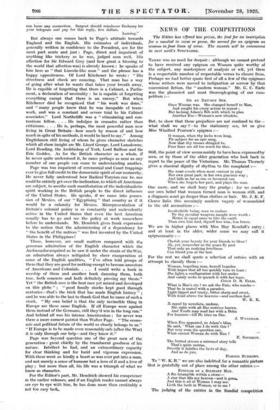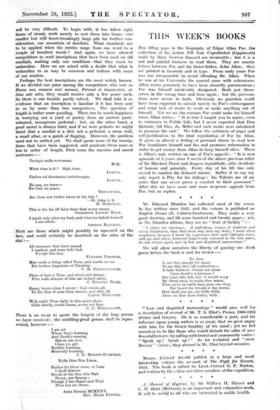NEWS OF THE . COMPETITIONS
The Editor has -oTered two prizes, the first- for an inscription for a sundial in verse or prose, the second for an epigram on woman in four lines of verse. The awards wit! be announced in next week's SPECTATOR.
ON AN EXTINCT SEX.
Once Woman was. She changed herself to Man,
And sought his every action to repeat ; But lacking Adam's Rib with which to plan
Another Eve--Woman's now obsolete.
But, to show that these prejudices are not confined to the— what shall we say ?—to the stationary sex, let us give Miss Winifred Pearson's epigram :— O woman, when thy locks were long, Fit subject for an epic song,
Now that thy tresses shingled be. Four lines are all too much for thee.
Still, the point of view seems mainly to have been expressed by men, or by those of the older generation who look back in regret to the peace of the Victorians. Mr. Thomas Thornely gives a classical dignity of rhythm to the complaint :— She most excels when most content to play Her own great part, in her own gracious way ; And falls as far as one so favoured can When she forgets her part, and plays the man.
One more, and we shall bury the grudge : for we confess our own belief that woman turned man is woman still, and a diagnosis must go deeper than clothes or hair. Mr. J. K. F. Cleave links this seemingly modern vagary of womankind to the old accusations :- Incalculable being, man to enslave
By thy peculiar weapons naught were worth : Better in equal arms to bite the earth Than own him lord, thyself less wise, less brave.
We are in higher places with Miss May Kendall's entry : and at least in the older, wider sense we may call it epigrammatic :— Cherish your beauty for your friends to bless ! Ah, yet, remember as the years fly past That only an undying loveliness
Can friend you at the last.
For the rest we shall quote a selection of entries with no attempt to classify them :- Woman, beguiling man, herself beguiles
With hopes that all too quickly turn to fears : She lights a conflagration with her smiles And vainly seeks to quench it with her tears.
COLIN D. B. ELLIS.
What is Man's sin ? we ask the Fate, who mocks—
That be is mated with a paradox.
Light-lipped and trusty, bitter sharp and sweet, With head above the heavens—and earthen feet.
W. K. R.
X-rayed by novelists, undone,
She sighs with all Her motives known.
And Youth may read her with a Bohn For honours—till He tries on One. 3. WYNDHAM.
When Eve appeared, to Adam's bliss, He said, ' What can I do with this ? '
But very soon the question ran, What cannot Woman do with Man ? E. SHERMAN.
The fretted stream a mirrored story tells
That's quite untrue, Sweetly it falsifies the facts of day, And so do you. HAROLD BURROWS.
To "NV. K. R." we are also indebted for a romantic picture that is gratefully out of place among the other entries :— EPIGRAM OF A SOLITARY MAN.
A fire intangible within a stone— A star that fills my heaven—and is gone. And this is all of Woman I may see. Lieth the fault in Woman, or in me ?
The judging of the entries in the Sundial competition THERE was no need for despair : although we cannot pretend to have received any epigram on Woman quite worthy of the subject, any masterpiece of analysis or wit, yet there is a respectable number of respectable verses to choose from. Perhaps we had better quote first of all a few of the epigrams whose writers were moved to indignation or sorrow by that convenient fiction, the " modern woman." Mr. G. C. Earle was the gloomiest and most thorough-going of our com- petitors :— will be very difficult. To begin with, it has taken eight hours of steady work merely to sort them into heaps—one smaller but still heart-breakingly large pile for further con- sideration, one mountain of derelicts. What standards are to be applied when the entries range from one word to a couple of hundred words ? And again, we have allowed competitors to send inscriptions that have been used on old sundials, making only one condition—that they must be =familiar. Here we are seized with a doubt that what is unfamiliar to us may be common and tedious with some of our readers.
Perhaps the best inscriptions are the most widely known. If we divided our prize among the competitors who sent us Floras non numero nisi serenas, Pereunt et imputantur, or Sine sole sileo, they would receive only a few pence each. So there is one trouble partly solved. We shall take it as evidence that an inscription is familiar if' it has been sent to us by more than two competitors. The question of length is rather more puzzling. There can be much happiness in worrying out a yard of poetry from an ancient parti- coloured, mossgrown pedestal ; but, on the other hand, a good moral is always brief, and if we were pedants we might insist that a sundial is a dial, not a pedestal, a stone wall, a small altar, or a patch of flagging. However, the problem need not be settled yet. We shall quote some of the inscrip- tions that have been suggested, and graduate them more or less in order of length. First come the maxims and moral 'sentences :— Vestigia nulls retrorsum.
N.H.
What time is it ? High time. Luscus.
Umbra sol dominatur imbribusque. Luseus.
No sun, no trace— No God, no grace. TRELAVNEY.
Are there not twelve hours in the day ?
—St. John ii. 9.
M. HERITAGE.
This is the far off fairy hour that never comes.
CELESTINE LAVENS WEST.
I speak only after my lord, and when he hideth himself I am silent.
ARTHUR BLANDEN.
Next are those which might possibly be squeezed on the face, and could certainly be inscribed on the sides of the dial :— All moments that have passed
I marked, and none hold fast Except this last. ELEANOR FARJEON.
Man made a thing called Time, and marks on me His broken fragments of Eternity.
V. H. FBIEDLAENDER.
Fleet of foot is Time, and stout and strong : Who walk abreast of him are helped along.
J. HERBERT BEAN.
Sunny hours alone I count : Cod counts all. To Sun of suns then mount, and offer all.
CANON MEREDITH.
Well might Time day in this quiet place. Glide slowly, sunlit hours, across my face.
C. C. Woom,soore.
There is no room to quote the longest of the long poems we have received ; the middling-great poems shall be repre- sented, however :—
I am set
Where San's burning And Earth's turning Sphere are met.
Come ye, get
Earthly learning,
Heavenly learning. I. G. HOBART-HA MPDEN.
Nulls Dies Sine Linea.
Rather lot them come, or Late I shall observe Steeds of the Sun who Bait Never, nor Swerve : Though I but Stand and Wait. Thus Let me Serve.
Anna Domini MCMXXV.
REV. Beau Powarz.























































 Previous page
Previous page